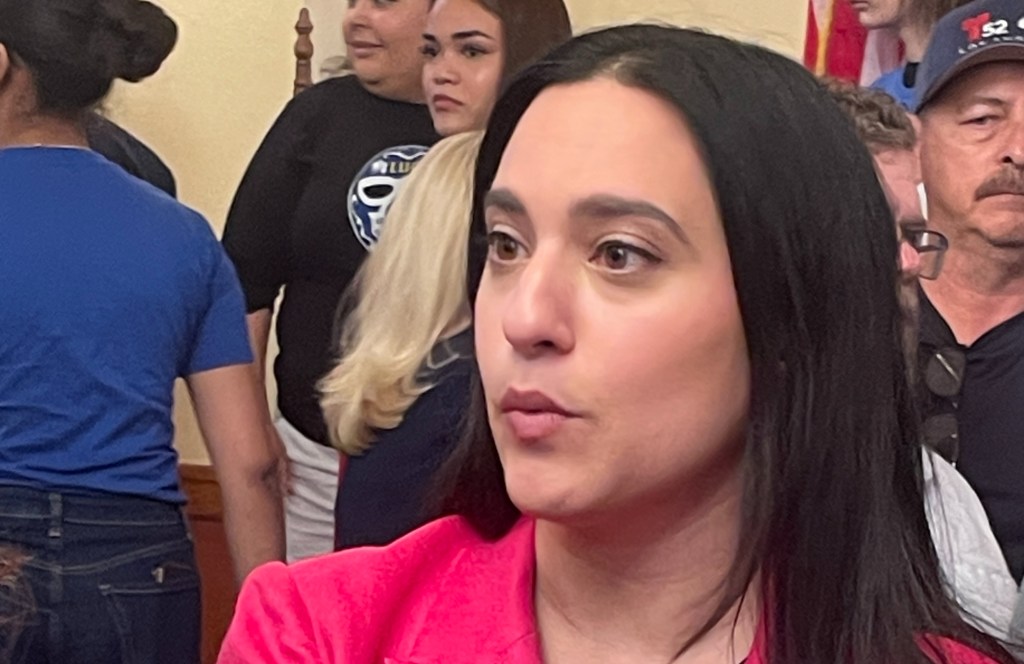
Matthew Bird

Audio By Carbonatix
When Jennifer Dunn’s second child was born, she asked the nurse why his stomach was bruised. She was told those aren’t bruises — those are his kidneys, visible through his transparent skin.
The boy, named Atticus, arrived 16 weeks premature. He weighed just 21 ounces at birth and spent his first 165 days in neonatal intensive care. Today he’s 2 years old and has cerebral palsy, a visual impairment and developmental delays.
Dunn told Phoenix New Times her story of taking care of the boy, as well as a second child with disabilities, after a news conference at the Arizona Capitol meant to rally support for federal health insurance. Community leaders, union leaders and lawmakers showed up to push Congressional Democrats’ key priority in the budget stalemate that led to a government shutdown this week.
First-term Democratic Rep. Yassamin Ansari, who represents Phoenix, argued that Medicare and Medicaid payouts — which would be slashed in the Republicans’ proposed budget — need to be preserved.
“People will die as a result of this shutdown,” Ansari said. “They are ripping away health care from 17 million Americans. … Already, hospitals have closed across the country and hospitals will continue to close.”
A study by the independent health policy research firm KFF found that the Republicans’ legislative centerpiece this year, the One Big Beautiful Bill Act, could strip more than $900 billion away from Medicaid during the next decade, resulting in 10 million Americans losing their health insurance.
To people like Dunn, a loss of coverage would be devastating. She told New Times that without Medicaid, medical bills would have bankrupted her family. She is unable to work because she is a full-time caregiver to her boys.
Dunn traveled from Arizona to Washington, D.C., to share her story with lawmakers this past summer as the One Big Beautiful Bill Act was being debated. While she was away, she got word that Atticus stood up for the first time.
“It’s like he knew I was in D.C. standing up for him, and he wanted to stand up for me,” she said, holding back tears. “I see leaders who do not have the courage of their convictions to face the people living with the results of those cuts. How do you put a price on our children?”

Matthew Bird
Invoking McCain
Francisco Torres, another Arizonan who shared his story at the news conference, said his body has fought itself since the day he was born. From childhood, he suffered from seizures that he controlled with ice baths to reduce his temperature.
As an adult, he suffered seizures so violent that he had to quit his job. For 10 years, he fought futilely to get disability pay. Eventually, a lawyer helped him get 10 months of back pay and a year of disability pay.
During this time, he underwent surgery to remove part of his brain. The surgery was successful; he has not had a seizure since 2018, and as of this month, he is no longer epileptic. But he warned of what could happen to patients like him if they couldn’t access care.
“Imagine being told a pill could’ve stopped the next seizure,” Torres said. “But you can’t have it unless you jump through their endless hoops, pay thousands out of pocket and risk your health for approval that never comes.”
Ansari invoked another disabled Arizonan — the late Sen. John McCain, who lived with permanent disabilities as a result of the torture he endured in the Vietnam War — in making her case that federal health coverage was an essential service that transcends politics. During Trump’s first term, McCain crossed party lines to cast the deciding vote against a bill that would have repealed the Affordable Care Act. He did it, he said then, because Trump’s measure would’ve raised health care costs for Arizonans.
“This is not about winning or losing,” Ansari said. “It is about doing what is best for our constituents. John McCain knew that. And I sincerely hope my Arizona Republican colleagues will come to the same conclusion.”
The federal government will remain closed until at least next week, when the Senate reconvenes. During Trump’s first administration, a government shutdown lasted 35 days.